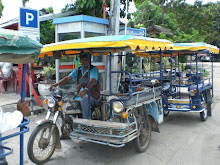On a personal note, having spent extensive periods of time in Southeast Asia, I feel that patron-client relations are the heart of relationships in the region. As an American, even from a middle income background, I am put pretty high on a pedestal to most Thais, even the elitists. I was privy to weekend stays at a beachside resort on the island of Chang by deans, and faculty of an elite Bangkok university because of my friendship with his American niece. Americans are considered very wealthy by Thai standards (westerners have typically been viewed as patrons, stemming back to colonial times), and my experience in the real estate world enticed the dean as he was seeking investors, and partners in a residential development. The patron-client relationship is not one of perfect balance (in Thailand), despite the reciprocal nature of the tie, because the client feels obligated to the patron. The patron has predominant power over the recipient (Neher 63). Personally, I have witnessed this, and by western standards it can be viewed as good and bad; good for the patron, bad for the client. The client definitely feels a sense of guilt, and will not complain if the patron is benefitting them or their family. This speaks volumes for the selfless nature of the patron, much of the time, putting their family’s needs first.
In any event, I would not have been given access to this elite group had I not been a foreigner who could benefit the client in some way. Don’t get me wrong, there are folks I have met who are genuinely interested in my friendship; however there are common instances where a reference to a gift of money is often. This is seen more by one who truly needs the help, and is accustomed to Nam Ja (spreading the wealth to your friends). So if I were in need they would reciprocate but usually it is a patron-client relationship in Thailand. By most accounts, I do not perceive a client-client pattern. In terms of men and women partaking in the patron-client relationship it appears as if men and women can act as either the patron or client more so in urban life, and/or with the more educated. This is due to independence created from the education many urbanites are exposed to, leading to higher paying vocations; whereas in the village life, the women is traditionally a stay at home, taking care of the children, and/or helping her parents.
Nonetheless, personal ties between social superiors (patrons) and inferiors (clients) are important to most Southeast Asians, and they are a fundamental element of social organization (Neher 60).
Works Used
Neher, Clark D. Southeast Asia Crossroads of the World. Dekalb: Center for Southeast Asian Studies, Nothern Iliinois University, 2004.

No comments:
Post a Comment